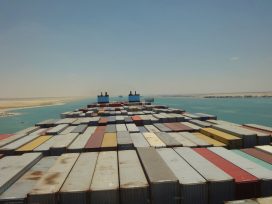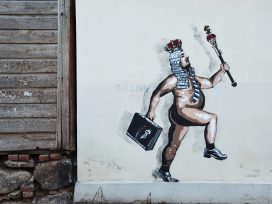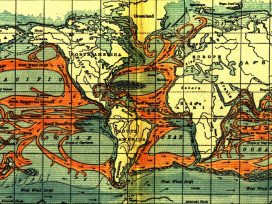Remi Nilsen: You and Antonio Negri’s upcoming book will be called Common Wealth.
Michael Hardt: Yes, we just turned in the manuscript to the editors, so it will still be a long time before it comes out.
One way it functions with us, with these books, is that when we finish a book, we start to criticize it. So when we finished Empire we were feeling that although the concept of multitude was central to us and to the book, we hadn’t developed it enough or in the way we wanted. Hence the next book was about “the multitude”. So after that book we felt that the notion of the common was central, but not developed enough.
It is not that our books are about just one thing – they end up being about many things – but the starting point was “the common”, the common wealth. Too often are we able to see the world only in terms of private and public property. Marx says at a certain point in the 1844-manuscripts: “Private property has made us stupid.” And it has partly made us stupid in that we can’t recognize the common. We tend to think that not just private property but also public property has made us stupid in that we are only able to think that the alternative is either private or public ownership. Yet much of the world is still common. There’s a lot of discourse about that now, but the notion seems to be used in its pre-modern meaning: the commons, common land, common woods, etc. But we’re more interested in universal production: ideas, images, social relations… things it’s hard to privatize. Which is what the multitude has in common, the shared faculties like language, which can’t be privatized…
Or even when they are privatized, it destroys their productivity. If a language were a private property it wouldn’t be communicative, but in the same way if it is regulated by the state it looses its capacity for innovation.
Language is a good example because it is so quickly destroyed by either private or public property. Another, minor but significant, example is the Internet, code, and information. The open source movement has said for a long time: The period of open access to code and information was the period of great creativity and expansion of Internet technologies and development. As things have been privatized – both information and code – creativity has been blocked. And generally what Negri and I try to understand with the notion of the biopolitical, or what we sometimes awkwardly call immaterial production, is precisely this: ideas, information and code, but also images, notions, and social relations. One of the hypotheses we try to develop is that this mode of production is becoming dominant today, in the same or similar way that industrial production was in an earlier era. All of those products are tendentially common. It is not that you can’t privatize information or knowledge, that happens all the time, but that a) they are difficult to privatize or make public because they are infinitely reproducible, and b) they loose their productive capacity when they are privatized.
So in the same way we think of the common as a different way of thinking private and public property, we want to try to envision an institution of the common. The common as a social and political form that constitutes an alternative to thinking either capitalism or socialism (capitalism as an expression of private property and socialism as an expression of public property) which would make the common the basis of a commun-ism: the institution of the common as a social institution.
So the upcoming book continues the analysis that we have been doing for a while now, of trying to understand how production has changed. I think in traditional terms you would call it an analysis of class composition: What is it people do at work? What is work today? How is it organized and structured?
RN: The upcoming book will then present further examination of Marx’s notion of the “general intellect” from Grundrisse, but at the same time it sounds like there is a change involved in the turn towards “the common” rather then “the multitude” and its “relationship of singularities”?
MH: I do think there are in some ways new directions in each book, but I do feel like it is a trilogy. It has been a fifteen year long process which has resulted in three books, and in each book we try to address the questions as the are posed, rather than pursuing some radical departure.
Part of the challenge is to recognize how multiplicity and the common are not only compatible, but also mutually necessary, rather than being conflictive. Because normally one thinks of unity and difference as being alternatives; you either have one or the other. Whereas we think that commonality and multiplicity are philosophically complementary.
RN: When you say that this immaterial mode of production is becoming more dominant than the industrial, do you see a conflict between this mode of production and the existing one, making the conflict predominantly with the existing capitalist mode of production?
MH: I do see it that way. Public and private property go hand in hand, capital always need the state as its mechanism. And what we call capitalist and socialist states have been different mixtures of private and public property. From this perspective, the communality between the two looks much closer.
Maybe you were worried that I was downgrading the conflict with capital by posing it that way… But I think our political alternative ha been impoverished when the only solution we can think of is to make it public property.
Let me give a slightly more concrete example. The best analysis we have of neoliberalism shares – beyond their analysis of the evils of privatization – the assumption that it is necessary to impose state solutions, i.e. either Keynesian or socialist models. I was thinking of the ones I admire the most, which are Naomi Klein’s The Shock Doctrine and David Harvey’s A Brief History of Neoliberalism. None of them explicitly say what the alternative is, and I think any critique of neoliberalism should reflect on what alternatives we have, on what would be different from neoliberalism. Both of them seem to assume that some form of state regulation and control is the alternative. But I think we need other alternatives because that one doesn’t thrill me. There must be something better, and I don’t mean this in an absolutist way à la “if we could abolish the state tomorrow… “. We need to broaden our political possibilities.
RN: In both Empire and Multitude you criticize the notion of sovereignty. Many critics have claimed that the wars in Iraq and Afghanistan have falsified the central premises of these books, in that the resistance in Iraq for instance is based on an idea of national sovereignty. But you are still not very enthusiastic about the resistance in its concrete form in Iraq and Afghanistan?
MH: The enemy of our enemy is not necessarily our friend. The fact that theirs are real and effective efforts against US imperialism doesn’t necessarily make them good. And even with my limited knowledge, some of them seem quite horrible.
The hypothesis in Empire – which I’m actually more and more convinced of; there are other things I doubt more and more – is not that nation states no longer matter, or that the functions of the nation states are no longer important, but rather that we have to recognize that they function within a larger framework, that they are important elements of this network power. It was this that led us to the hypothesis that the US can no longer dictate global order, in fact that no nation state can do that any more. It is not the case that if the US isn’t powerful enough, then China, Russia, or some caliphate will be. No, the terms of sovereignty, of political order, has changed so that no nation state can control them any longer. The Bush lot, Cheney and Wolfowitz, thought that they could act like imperialist, that they could dictate global order. And we have seen little by little the demonstration of their failure, of the final burial of unilateralism: first with military failures, then with the social and economic failures in the US. I take that as evidence of the impossibility of national sovereignty dictating global order.
So we have to create a new concept of sovereignty, or maybe a different word than sovereignty, that allows us to think this collaboration of powers, of political and economic dominant nation states with corporations and international economic institutions. But this doesn’t mean that nation states are not important, nor that the US isn’t important as a force of domination, or that Bolivia isn’t important as a demarcation of lines of defence, is just means that they have to be considered in a larger framework.
When you think about the struggles in Bolivia that led to Evo’s election, one of the main starting points was the water war in 2000. It was a typical neoliberal privatisation story: the world bank told the Bolivian government at the time that they had to privatise the water services, because it was costing more than they were making. So they sold it to a conglomerate foreign corporation, who rationalized the pricing, which meant they raised the prices to what it actually cost, and this lead to massive protests. Who were the protests against? They were against the Bolivian state, but they were also not against the Bolivian state. They were against something else. They were against the Bolivian state in so far as it was an element within the circuit of international institutions (IMF, The World Bank), international corporations, and also, of course, the US and its dictation of a certain kind of neoliberal economic policy.
RN: And this is your concept in Empire. Much of the criticism after Empire and Multitude has been that the war in Iraq is classic imperialism. Has the Iraq war changed the basis for your concept?
MH: No. Maybe I’m stubborn or blind but it has only reinforced it. Bush, Cheney, and Wolfowitz were drunk on power, so you could accept that they thought they were more powerful than they actually were. But those on the left who also accepted that Bush, Cheney, and Wolfowitz were more powerful than they were, those are the ones to blame. I think there was a certain – and now I’m being uncharacteristically mean – comfort in this: “We don’t have to think about new concepts, it turns out everything is just as we thought, that it was just US imperialism. We can use all the old terms!” I assume the same people are now able to recognize that this was not the case. I agree with you that the war in Iraq was a classic imperialist endeavour: It was a classic imperialist endeavour conducted by a buffoon that was mistaken. To see Bush as anything else is to mistake Napoleon III for his uncle, as Marx mockingly said about the people in France in 1850s. It doesn’t mean they are not dangerous; they may even be more dangerous.
What Bush and his group have proven is that imperialism is dead, they have shown how impossible it is. Rather than think that the form is still alive, and we just need a new actor for it, I think the form itself has changed.
RN: The situation in Georgia looks like a rerun of classical imperialism of the nineteenth century: a contest between four or five actors in which the Caucasus was a central playing field. Is not imperialism coming back to life again now that we have more actors instead of just one dominant superpower?
MH: It certainly brings up plenty of memories… But I think that you’re raising the dead when seeing these echoes of the past and therefore missing the current situation. When we talk about “empire”, it doesn’t mean that there aren’t going to be conflicts between the aristocrats of this global order, that the capitalist or political factions aren’t going to want a greater share.
RN: The current financial crisis concerns private and public property in a very interesting way. How do you see the recent state intervention into private companies?
MH: One thing I find interesting is that the US, with its neoliberalistic propaganda, has taken a dramatic turn in the last two weeks. The medicines or practices the US has preached or forced others to apply, the US has not applied to its own crisis. The American state has intervened, not just to defend the American economy, but also the interests of particular capitalists and of the capitalist system as a whole. So once again we see this mutual relationship between private and public property, the capitalist state’s central role, that capital is dependent on support from a structure of sovereignty.
It is difficult to say what this means to us. I don’t know if the so-called “general collapse theory” is the right way to understand what is happening. I don’t think believing or hoping this will lead to a general collapse is the right way to go.
RN: Could this crisis open up for what you in Empire call “the actualisation of the multitude”, that the multitude will in itself constitute a class and thereby a political subject?
MH: There is this Marxist tradition that separates between objective and subjective crisis. The objective crisis, which is caused by the functioning of capital (cyclic crisis, etc.), doesn’t constitute a threat to capitalism as a whole. While crisis that result from the pressure of the working class – from an expansion of proletarian desires, which can lead to an inflation in working class demands (social security, welfare, etc) – can create openings that can give birth to even autonomous projects. But I would hesitate to claim that the financial crisis on Wall Street is a result of our expansion, of the expansion of the social movements.
RN: In the news over the last few weeks we have seen the political elite express its interests more openly. In recent history we have seen horrible things happen when the interest of capital and the ruling class are threatened in a more direct manner. Do you see a move in that direction?
MH: As I mentioned, the US is no longer able to dictate global order. That does not mean that the situation is not a dangerous one. A wounded elephant can still squash people.
An important difference between Europe, and the US to some degree, in the thirties and today is that there is no present communist threat. I don’t see the rise of fascism as a prominent aspect of this crisis. I disagree with many of my friends who call the US fascist, which they do with reason: torture, Abu Ghraib, external wars to solve domestic problems… But for me, this accusation or fear is that it is an abrogation of the rule of law and in some ways the rule of capitalism. It proposes a form of sovereignty that is in some sense outside the social field, standing above it. In both political and theoretical discussions in the recent years there has been an overemphasis on the category of sovereignty in political analysis, on the extraordinary, on the state of exception, and therefore a lack of analysis of what to me seems the central, but ordinary, levels of daily life: the functioning of law, of capitalism. The focus on Guantanamo and Abu Ghraib takes the attention away form the real substance of the ruling powers of today. If we were moving towards fascism, it would be noticeable on these levels, that capital and state power is dysfunctional in everyday life. But their power seems to me quite solid.
RN: Over the last years you and Negri have worked quite a lot with the “metropole”, a metaphor that situates the political thinking at the heart of the empire, the mother city of the empire. Has the political terrain of resistance changed from the periphery to the centre?
MH: The metropole is a central theme in Common Wealth. The hypothesis is that the metropole is to the multitude what the factory was to the industrial working class. The metaphor functions on different levels:
1) As the site of production, in the sense that production is no longer isolated in the factory, but spread out across the city, in social relations, etc.
2) As the site of exploitation and expropriation, in the same way that the factory once was. For example, real-estate values are not determined on what’s inside the house, but by the common that is produced by people in the city: a culturally diverse neighbourhood, or one with a lot of social tensions, or a really boring one. All of this is a result of the production of the common, which is expropriated by the property value. A rundown and cheap neighbourhood attracts students and artist, it becomes a cool place with cafes, galleries and clubs, then the rich move in and the place turns really boring. It is all about the expropriation of the common.
3) It is, as you point out, the centre for hierarchies, as a “metropolis” in both ancient Greek and French colonialist sense.
4) And it is the site of antagonism, of revolt. Metropolitan revolt is a strike against capitalism, but also as a revolt against the form of the city itself. A direct example would be los piqueteros in Argentina after 2000. Unions of unemployed workers, who can’t strike at the factory because they don’t have a factory, and therefore choose to strike in the city, picket the streets blocking the roads. In the same way that the industrial working class occupied the factories, they occupy the city. A more complex example is the revolt in les banlieues of Paris in 2005. Of course the youth in the suburbs revolted against the racial hierarchies, the new work laws, and precariousness in general, but this is concretized as a revolt against the city. What did they burn? Cars, modes of transport, schools – these are all symbols or loci the city has of the means of their exclusion and submission.
The analogy is useful. This does not mean that people in the countryside are stupid, but rather that there has been a “metropolitanization” of the entire world. The divisions between the countryside and the city are not longer what they were.
RN: But does this not only apply to the Western societies, the city as a city for production and rebellion, as a result of the exportation of the industrial working class to, for example, Southeast Asia?
MH: In Southeast Asia, at least the countries I know, there are Internet cafes on every street corner, fare more than in Europe or the US. There is of course a metropolitanization of the countryside in terms of control, but there is also a metropolitanization of the world in terms of communication. I’m here thinking in analogy to what Marx says in the “Brumaire”, when he criticizes the French peasantry in the 1850s for being stupid, for not being able to represent themselves: they were isolated and lacked the possibility to communicate with each other, they lacked information. The workers on the other hand communicated every day in the factory. It is this division that no longer exists.






